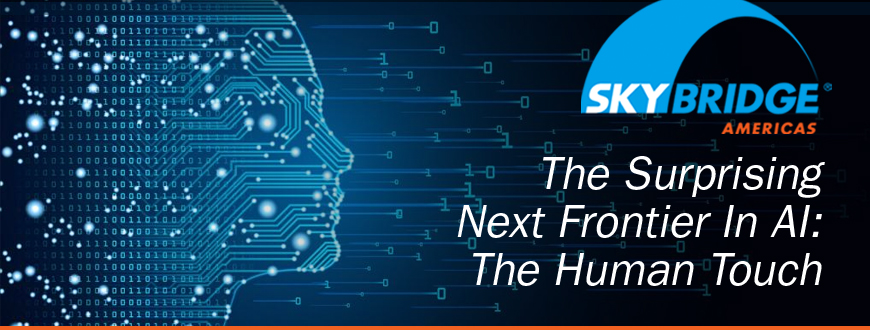
Recently, Michael Brenner, marketing leader and author of the book Mean People Suck, explored how AI is, indeed, changing how businesses and consumers interact with each other.
In his Chiefmarketer article, “The AI Paradox: Why More Automation Means We Need More Humanity,” Brenner reminds us all of the one, fundamental, inescapable, truth: AI can make it easier for brands and consumer to complete transactions – but customers will be left disengaged and dissatisfied by those brands who cannot deliver human empathy and judgment.
Check out his article below:
The AI Paradox: Why More Automation Means We Need More Humanity
By Michael Brenner
Marketers and businesses are increasingly using AI to automate functional processes as well as customer interactions. AI has been shown to help brands understand their audience better, reach them at the right times, improve the accuracy of marketing campaigns, and enrich user experience, ultimately leading to cost savings and better ROI.
The question marketers are failing to ask, however, is “Are consumers satisfied with the buying experience?”
The paradox of today’s data-driven, AI-driven marketing is that despite a large number of channels that provide information and customer service (Hello, chatbots!), consumers are craving more human experiences.
In a report titled Are You Listening? The Truth About What Customers Want in a Digital World, Calabrio found that three out of four consumers in the US and UK are more loyal to businesses that give them the option to interact with a human as opposed to only chatbots or digital channels. That’s not all—a full 37% question the legitimacy of the company itself, if not given the option!
So how does a brand reap the benefits of marketing automation, and become more “human” at the same time? The answer lies in organizational empathy.
Does Empathy Matter in Marketing?
In marketing, we talk so much about customer journey and experience. Antonio Damasio, eminent neuroscientist and Professor of Psychology, Philosophy, and Neurology, at the University of Southern California, said: “We are not thinking machines that feel, we are feeling machines that think.”
This is underscores the importance of empathy in marketing and customer experience, especially where AI is involved.
In an article on Clickz, Kevin Lindsay, director of product marketing at Adobe, explained how AI has the potential to beat human marketers at analyzing visitor and customer attributes, processing the most relevant ones, personalizing touchpoints in real-time, and delivering the right solution, all at scale. However, using AI to know how their customers are feeling at the moment, and humanizing their experience, is still a “brand fantasy.”
Because as Mary Beech, CMO and VP, Kate Spade, so eloquently puts it, “The best marketing isn’t about the brand; it’s about the customer.”
The Limits of AI, Automation, and Martech
Even though AI has pervaded every aspect of modern life and artificial empathy is now a thing, technology still has some way to go beyond “Alexa, what should I cook for dinner?”
While we’ve been debating the ethical complexities and utopian avatars of AI for long, the deepest of deep minds still remains a few marbles short of the average human marketer. Here are some inadequacies that might limit the level of automation you can achieve:
- Complexity of implementation: “Algorithms” and “models” are terms full of limitless possibilities, but they are guzzlers of resources, time, effort and money. They need time and expertise to research, set up, test, and implement. After that, there is a steep learning curve for the end users if they are to make the most of it. Finally, there is an intensive (and expensive) maintenance process that involves constant verification of data and results.
- Robotic customer service: Chatbots can seem human-like to most customers most of the time. Until of course an issue that the machine hasn’t learned how to deal with crops up. The lack of emotional intelligence or knowledge of nuances in language can lead to bots being anything from unhelpful to offensive to spooky at times.
- Uncertainties: The absence of human discretion leads to the system making some not-so-tactful or ineffective decisions. Do you really need to send an email for every action a user takes within your app? Why do you need them to log in with their Facebook account? Should you wish them on their anniversary when you can’t be sure they’re divorced?
Read the entire article here >
Bobby Matthews
Senior Vice President, Sales and Marketing
Skybridge Americas
bmatthews@skybridgeamericas.com
Find out how Skybridge Americas can help you delight your customers and grow your business.
We seamlessly integrate our superior customer care skills with your brand messaging. For more information, contact us at 763-299-4570 or submit our contact form.

